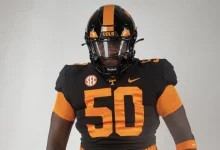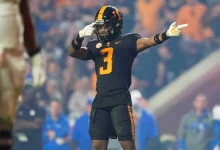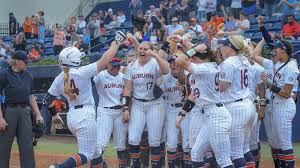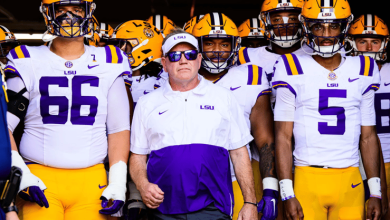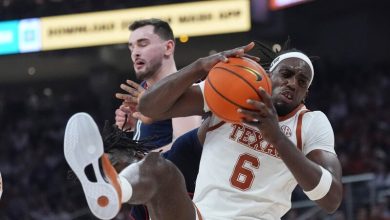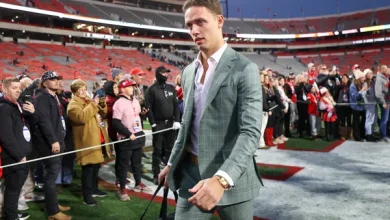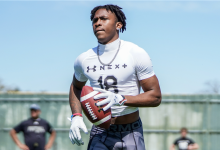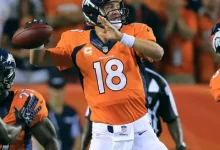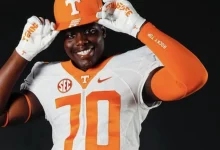Georgia Bulldogs coach Kirby Smart didn’t hold back with Paul Finebaum about NIL and the future of college sports
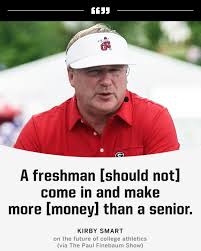
Kirby Smart, the head coach of the Georgia Bulldogs, has always been known for his directness and candid approach to the game of football. Whether it’s discussing strategies for winning national championships or addressing off-the-field issues, Smart is unafraid to speak his mind. In a recent interview with Paul Finebaum, Smart didn’t hold back when discussing the growing influence of NIL (Name, Image, and Likeness) in college sports, the challenges it presents, and his concerns for the future of the game.
The conversation between Smart and Finebaum was an insightful and revealing look into one of the most important issues facing college sports today. With the explosion of NIL deals in recent years, the landscape of college athletics has changed dramatically, and Smart’s perspective is one that both fans and analysts alike have been eager to hear. The impact of NIL on recruitment, player compensation, and the structure of college sports as a whole is a topic that has sparked debates across the country, and Smart offered his unique insight as both a coach and a former player.
In this article, we will take a closer look at the major points Smart made during his conversation with Finebaum, the implications of his statements, and how these views reflect the broader issues surrounding NIL in college sports.
The Rise of NIL: A Game-Changer for College Athletics
The NIL era officially began on July 1, 2021, when the NCAA lifted its restrictions on athletes profiting from their name, image, and likeness. Since then, college athletes have been able to sign endorsement deals, make money off their social media platforms, and engage in various forms of monetization that were previously prohibited. While this change has been hailed as a long-overdue victory for college athletes, it has also raised several questions about the future of college sports, and Kirby Smart has been one of the more vocal coaches in discussing these concerns.
In his conversation with Paul Finebaum, Smart didn’t mince words when addressing the role of NIL in shaping college football. One of the key points Smart made was that NIL, while beneficial for athletes in terms of financial freedom, has created a paradigm shift that is both exciting and challenging for the future of college sports.
“I think NIL has changed the landscape of college sports forever,” Smart said. “We’ve entered a new era, one where athletes can now make money in ways they couldn’t before. But as much as it’s an opportunity for athletes, it’s also a challenge for coaches and programs trying to maintain a level playing field.”
Smart acknowledged that NIL is an important tool for college athletes, giving them the ability to capitalize on their popularity, social media influence, and unique personal brands. However, he also expressed concern that the current system has the potential to create uneven playing fields, where teams with larger financial resources can offer significantly more to prospective players than smaller programs.
“This isn’t just about the money,” Smart explained. “It’s about the integrity of the sport. We’ve got to find a way to balance athlete compensation with maintaining the tradition of college football and ensuring that the competition remains fair for all teams.”
NIL and Recruiting: The New Frontier of College Football
One of the most significant changes brought on by NIL is its impact on recruiting. In the past, recruiting was largely about on-field performance, academic success, and a prospective player’s fit within a program’s culture. However, with the introduction of NIL, recruiting has taken on an entirely new dimension. Programs are now competing not just for players’ athletic talents but for their potential to sign lucrative endorsement deals and build personal brands.
Smart expressed concern over the increasing importance of NIL in the recruitment process, stating that it’s becoming more and more difficult to differentiate between programs based on the traditional aspects of recruiting. “It’s a big factor in recruiting now. You’ve got programs that are using NIL deals as a way to attract players, and it’s a huge part of the conversation with recruits,” Smart said. “But it shouldn’t be the only factor. We’ve got to make sure that we’re recruiting players who want to be at Georgia for the right reasons—because of the tradition, the coaching staff, and the opportunity to develop as a player.”
Smart pointed out that NIL has changed the expectations of recruits, as they are now more likely to evaluate their potential earnings through sponsorships and deals rather than just focusing on the overall experience of playing college football. This shift in priorities is causing coaches like Smart to adapt to a new world of recruiting—one where financial incentives are taking center stage.
“We’re in a place right now where recruits have more opportunities than ever to make money,” Smart said. “That’s a positive thing, but at the same time, it brings some challenges. How do you balance the promise of NIL with what we’re trying to build here at Georgia? We want players who are coming here because they want to play for the team, develop, and win championships—not just because of the money they can make.”
The Impact of NIL on Team Culture and Player Development
One of Smart’s major concerns about NIL is how it may affect the culture of his program. Traditionally, college football has been a team-centric sport, with a heavy emphasis on camaraderie, shared sacrifice, and collective success. However, the rise of NIL has created an environment where individual athletes can sometimes prioritize their personal brand over the team’s success.
Smart was particularly candid when discussing the potential for NIL to impact the locker room dynamic. He emphasized that maintaining a strong, cohesive team culture is essential for success, and that the introduction of significant financial incentives for individual players can sometimes create friction within the team.
“There’s no question that NIL brings a new element to our program,” Smart said. “I’m not naive enough to think it doesn’t change the way some players approach their time at Georgia. But what we’ve always tried to build here is a culture of selflessness, of players putting the team above all else. NIL can make that harder. It’s something we have to manage, and it’s something that all programs are going to have to figure out.”
Smart also addressed the growing divide between players who are earning significant money through NIL and those who may not be as high-profile or marketable. “You can’t have a team that’s divided by how much money someone is making,” Smart said. “We’ve got to keep the focus on the team, on development, and on getting better every day. If we don’t, it can create problems that affect our performance on the field.”
The Future of College Football: A Call for Regulation
While Smart has been outspoken about the opportunities that NIL provides, he also called for stronger regulation to ensure that the system remains fair and balanced. One of the most critical issues Smart raised was the lack of uniformity in NIL deals across programs. With some schools having larger resources to offer more lucrative deals, Smart fears that smaller programs could be left behind.
“There has to be some sort of regulation,” Smart said. “I’m not talking about limiting how much a player can make—I’m talking about making sure the playing field is level. Right now, it’s not. It’s a free-for-all. If you’re at a school that doesn’t have the resources, you’re at a disadvantage.”
Smart stressed the importance of creating a system that allows for fair competition while still offering athletes the opportunity to profit from their name, image, and likeness. “We need to find a way to keep college sports competitive, to maintain the integrity of the game, and to make sure that all athletes, regardless of where they play, have the same opportunity to succeed,” he said.
The Long-Term Implications of NIL for College Sports
Smart also took the opportunity to discuss the long-term implications of NIL for the future of college sports. While the immediate impact has been largely focused on football and basketball, Smart believes that the ripple effect will eventually be felt across all sports.
“College sports as a whole are going to change because of NIL,” Smart explained. “Football and basketball are just the beginning. This is something that’s going to affect women’s sports, Olympic sports, and everything in between. It’s going to create new challenges for universities, coaches, and administrators to balance athletics with academics, community outreach, and overall student-athlete welfare.”
Smart expressed hope that, with proper regulation and guidance, NIL could eventually become a positive force for college sports, allowing athletes to be compensated fairly without compromising the values of college athletics. However, he was clear that it would take a collective effort from schools, coaches, administrators, and governing bodies like the NCAA to ensure that NIL doesn’t erode the foundation of college sports.
Navigating the New Era of College Sports
Kirby Smart’s candid conversation with Paul Finebaum shed light on the complexities and challenges surrounding the growing role of NIL in college sports. As a coach who has experienced the highs of winning a national championship and developing elite talent, Smart has a unique perspective on how NIL is reshaping the landscape of college football.
While Smart is a staunch advocate for giving players the opportunity to profit from their name, image, and likeness, he also understands the importance of maintaining the integrity of the sport and ensuring that competition remains fair for all programs. He is clear-eyed about the challenges that NIL presents—both for recruiting and for maintaining team culture—and he is calling for greater regulation to level the playing field.
As college sports continue to evolve in the NIL era, it’s clear that Kirby Smart will remain one of the most influential voices in the conversation, advocating for solutions that balance player empowerment with the values of college athletics. The future of college sports may be uncertain, but coaches like Smart are working tirelessly to ensure that the integrity of the game remains intact as they navigate this new frontier.

